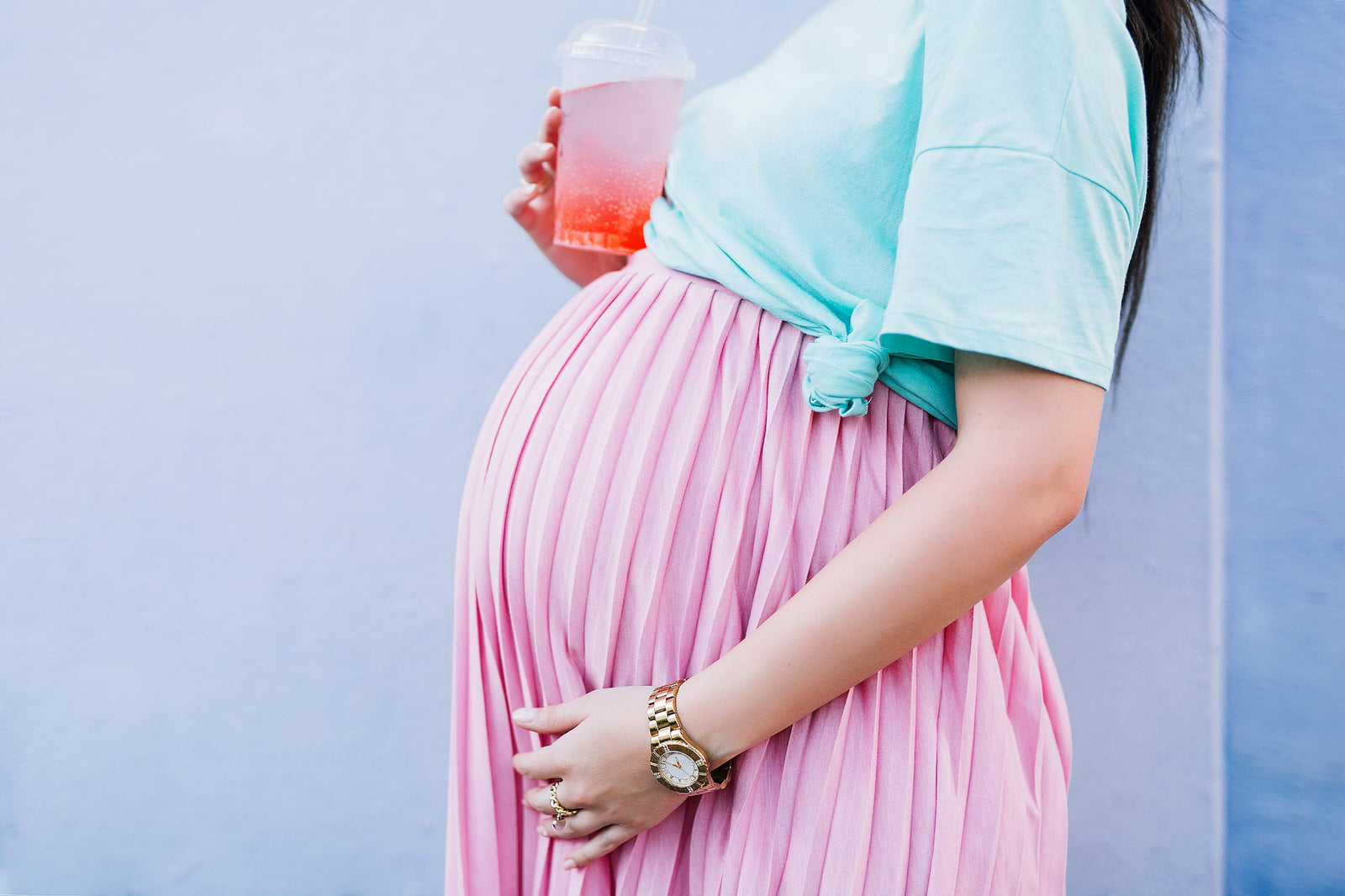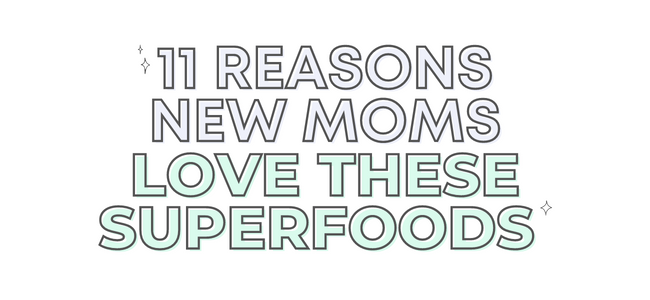The Best Drinks for Pregnancy: From Starbucks to Electrolytes

The moment you discover you're expecting, your world changes in an instant. You start asking yourself questions like ... Can I still enjoy my morning coffee? What foods and drinks are safe now? Can I still have my daily Starbucks drink?
As a new young mother, I was unprepared for the changes pregnancy would bring to my body. I was wholy unknowledgeable about my needs, my babies needs and that I even needed to change my diet.
As an expectant mother, the food and drink choices you make directly impact your health and your child’s development. My hope is that my story can help mamas-to-be to make more informed decisions and that it can help prevent them from having to struggle with any pregnancy related health issues, such as gestational diabetes or preeclampsia.
In this article, we'll explore the best drink options for pregnant women. With so much conflicting information on what beverages are beneficial versus detrimental, it's tough to know what to sip and what to skip. By the end, you'll feel empowered knowing how to navigate the world of pregnancy-safe drink options.
What I Learned From Undiagnosed Gestational Diabetes
Let me paint the picture for you as to how this came along. I was 19 years old at the time. I think the extent of my vegetable catalog was green beans and peas. My diet at the time was largely filled with fast food, pizza, soda, coffee bars, and all the sugar-sweetened drinks you could want. I ate whatever tasted good and was easy to prepare.
Why, oh why, did no one, not a single soul, say anything to me???
I passed my glucose tolerance test and headed into my third trimester without a flinch from my primary care provider or OB/GYN. There was no mention of a special pregnancy diet or any other recommendations.
During my baby shower, everyone seemed to comment on the softness of my skin, especially my legs. I thought, "Wow. Pregnancy is pretty awesome." But it wasn't.
It was undiagnosed gestational diabetes.
I only discovered that I had gestational diabetes when I went into preterm labor at 33 weeks. Blood tests revealed what had been hidden all along.
Now, as an advocate for new and pregnant mothers, I'm always quick to share my story of the lessons learned and knowledge gained. Plus, as a registered nurse and doula, I see firsthand how important it is to avoid extra sugars and caffeine for pregnant mamas to have the healthiest babies.

Why Staying Hydrated Is Essential During Pregnancy
From the minute you conceive, hydration takes on new meaning. Your water needs increase to help nurture your growing baby. Consuming adequate amounts of liquids during pregnancy does far more than just quench your thirst - it directly benefits your health and your baby's development.
During pregnancy:
-
Your blood volume rises substantially, increasing by 30-50% to deliver oxygen and nutrients to your developing baby.
-
The placenta relies on sufficient fluids to optimally form. This crucial organ delivers nourishment and protection to your little one throughout pregnancy.
-
Increased fluids help form the amniotic sac to properly cradle your growing baby. This source of cushy support prevents injury from outside pressure.
When you stay hydrated, these foundations for a healthy pregnancy take shape to benefit your baby. Neglecting your fluid needs puts both you and your child at risk. Plus, there are many benefits from increasing your fluid intake that will make your pregnancy that much easier.
But with so many drinks from a daily Starbucks run to hydration and electrolyte drinks, smoothies, and bottled juices. What are the best options, and can any be dangerous for mamas-to-be?

Not All Drinks Are Safe For Pregnant Women
Amidst the sea of tantalizing drinks filling store shelves, it becomes difficult to know which optimally nourishes you and your baby versus those that spell trouble.
While most beverages can be enjoyed in moderation, some concerning ingredients require caution.
-
Too much caffeine may increase the chance of low birth weight and miscarriage.
-
Too much sugar may increase the chances of gestational diabetes and/or preeclampsia.
-
Tap water can be contaminated with bacteria, lead, or pesticide residue. Filtering is smart.
-
Bottle juices can be unpasteurized and be contaminated with harmful bacteria for you and baby.
-
Alcohol readily crosses the placenta and can damage your baby's development. It's safest to abstain completely.
Most of these are pretty obvious. But it's really easy for a new mom to get too much sugar and caffeine without realizing it. Plus, many aren't even aware of the dangers of some bottled juices.
Here's what you need to know about caffeine and sugar intake.

Caffeine Intake and Pregnancy: How Much is Safe?
That enticing morning mug (or afternoon...or evening) of coffee provides warm comfort, a much-needed energy boost, and yes - caffeine. While coffee may seem harmless, is it still okay to indulge in your beloved brew now that you're expecting?
What are the risks associated with too much caffeine during pregnancy?
Too much caffeine can increase your heart rate and blood pressure - not an ideal combo when your cardiovascular system is already working overtime during pregnancy. Some studies have linked excessively high caffeine intake with an increased risk of miscarriage and low birth weight.
As a central nervous system stimulant, caffeine crosses the placenta - potentially impacting your baby's developing neurological system and growth. No amount has been deemed completely “risk-free,” but since caffeine easily crosses the placenta and acts as a stimulant, it makes sense to err on the side of caution.
How much caffeine is recommended for pregnant women?
The American College of Obstetricians and Gynecologists recommends limiting caffeine to less than 200 milligrams per day during pregnancy. That's roughly equivalent to 16 ounces of brewed coffee or two shots of espresso.
If going completely cold turkey makes you want to hibernate for 40 weeks, there are still ways to enjoy your java fix in moderation. While research is ongoing, evidence points to 200 milligrams or less as a safe zone for pregnant caffeine lovers.
I know the prospect of giving up your beloved Starbucks brew seems daunting, but just remember - it's only temporary! Your growing baby will thank you for it later.
Now that we've determined what moderate caffeine intake looks like, let's explore sugar intake and what to be on the lookout for.

Sugar Intake & Gestational Diabetes During Pregnancy
Wanting to indulge in sugary lattes, sodas, and sweet tea may intensify when pregnancy cravings strike, but before you sip, it pays to understand how added sugar affects you and your growing baby.
While a moderate amount of sugar is generally considered safe, excessive consumption can spell trouble. Let's explore recommended sugar limits and how to keep it in check during pregnancy and beyond.
Downing high-sugar drinks daily during pregnancy can lead to:
-
Excessive weight gain, elevating risks like gestational diabetes and preeclampsia.
-
Energy crashes as blood sugar spikes and then plummets, leaving you feeling drained.
Research also suggests babies exposed to high sugar intake in utero face an increased risk of obesity and heart disease later in life. For both you and baby's long-term health, added sugar holds little benefit.
How much sugar is recommended for pregnant women daily?
-
Per the World Health Organization (WHO), limit added sugars to 25 grams or 6 teaspoons per day- about 5% of calories.
-
The American Heart Association advises no more than 100 calories or 6 teaspoons of added sugar per day for women.
-
Cutting back to 15 grams daily has been shown to optimize well-being during pregnancy.
Use these guidelines to gauge the added sugar in your beverages. Even occasional drinks can add up quickly.
In particular, Starbucks offers a wide range of pregnancy-friendly options to satisfy any craving. But these guidelines can be applied to any coffee shop, from Dunkin Donuts to Caribou Coffee.

What To Order At Starbucks When Pregnant
For many women, a Starbucks latte run is a sacred ritual. Although you may have to forgo some indulgences during pregnancy, like a sugary Frappuccino, there are still plenty of yummy drinks you can enjoy at Starbucks while pregnant!
While Starbucks menus offer many options, pay extra attention to these two ingredients, caffeine and added sugar. You can still have regular iced coffee, hot brewed coffee, half-brewed coffee, or other coffee drinks. Just as long as you moderate caffeine consumption throughout the day and follow these recommendations.
Although there are a lot of pregnancy-safe options at Starbucks. We're going to focus largely on options that are non-caffeinated and low-sugar.
Just remember you can always customize any drink to make it more pregnancy-friendly by:
-
Ask for it "decaf" or "half-caff" to reduce caffeine.
-
Opt for the smallest size - "tall" or "short" to minimize caffeine and sugar.
-
Ask for "no syrup" or "less pumps" to reduce excess sweetness.
Let's start with the absolute safest, no-brainer best starbucks pregnancy drinks, the ones with no caffeine content.
Non-Caffeinated Starbucks Drinks for Pregnant Women
For expecting moms looking to avoid caffeine entirely during pregnancy or just have a lower caffeine intake, Starbucks offers some delicious caffeine-free options beyond decaf coffee. Here are a few to try:
Latte Steamers
Steamers are essentially steamed milk that comes in a variety of flavors like vanilla, caramel, and pumpkin spice. They provide a creamy treat reminiscent of a latte, without the coffee. Get creative flavors like caramel brulee latte, cinnamon dolce latte, or peppermint white chocolate mocha. Ask for fewer pumps for less sugar or their sugar-free options.
Starbucks Refreshers
The Strawberry Acai Refresher is a customer favorite, blending juicy strawberry and acai flavors into a refreshing, fruity beverage. It does contain natural green coffee flavor, providing a very low amount of caffeine overall. Sipping on a tall version, you'll be getting 35 mg of caffeine and 16g of sugar.
Lemonades
Lemonades are always a refreshing beverage, and here the lemonade is as basic as they come. Water, lemon, and sugar. This drink has no caffeine and when choosing a tall size, adds 19 g of sugar to your day.
Teas
Caffeine-free herbal teas are a great option, including Mint Majesty® or soothing chamomile. Emperor's Clouds & Mist® Green Tea delivers a light green tea flavor with just 1mg of caffeine. *Not all herbal teas are safe. Please read the ingredients on the label of the tea blends. For example hibiscus tea is best avoided during pregnancy.
Hot Chocolates
Craving something indulgent? Hot chocolates like the Classic Hot Chocolate provides sweet comfort without the caffeine kick. Picking up a tall version, you'll be getting 18 mg sugar and 15 mg of caffeine.
So for moms looking for a special, coffee-free treat during pregnancy, Starbucks offers plenty of options!
When you're not going to your favorite coffee shop, another popular option for added hydration is electrolyte drinks.

The Best Electrolyte Drinks for a Healthy Pregnancy
As your baby blossoms within you, your body's nutrient needs skyrocket. One vital component that keeps both mama and baby thriving? Electrolytes.
Electrolytes are electrically charged minerals that help the body work optimally. They have a number of key roles:
-
Hydration regulation: Electrolytes control fluid levels, preventing dehydration. This becomes especially crucial as blood volume rises during pregnancy.
-
Muscle and nerve function: Electrolytes carry electrical signals that enable muscles to contract and nerves to fire properly. This powers processes like digestion, circulation, and uterine contractions during labor.
-
Nutrient delivery: These minerals transport nutrients where they need to go. Your growing baby relies on this for development!
When your electrolytes are balanced, both you and baby reap the rewards. An electrolyte boost ensures your body has the oomph to take on the day. Luckily, there are lots of tasty ways to replenish electrolytes aside from gulping down water. Let's explore smart options:
-
Regular H2O: Drinking water is the first thing any pregnant woman should focus on. But just make sure to use filtered water! Some bottled waters even contain electrolytes.
-
Coconut water: A natural hydrator that serves up sodium, potassium, magnesium, and calcium. It's nature's Gatorade!
-
Fruit-infused water: Add lemon, lime, watermelon or berries to infuse hydration with electrolytes.
-
Pregnancy-safe greens powder: A natural source of electrolytes from nutrient-dense greens, it also provides a great source of natural folate.
-
Hydration drinks and packets: These small packets are easy to carry in your purse to add to bottled water for electrolytes on the go. Brands like Pedialyte, LMNT, and Liquid IV are very popular options.
While electrolyte drinks can help replenish depleted nutrient stores during pregnancy, it's wise to enjoy them in moderation. Be sure to read labels carefully and watch for excessive added sugars, even from natural sources like honey or maple syrup.
The American College of Obstetricians and Gynecologists recommends pregnant women limit sugar intake to 6-9 teaspoons per day, so gulping down sugary electrolyte beverages too frequently can surpass that limit. Save higher-sugar sports drinks for times of exertion when you sweat out electrolytes, and stick to lower-sugar options like coconut water for day-to-day hydration.
Overall, plain water should remain your primary fluid source during pregnancy. Look at electrolyte drinks as occasional supplements, not water replacements. With balance and awareness, you can effectively and safely restore electrolyte levels when needed.

Use Caution With Bottled Juices
Browsing the juice aisle, it's tempting to toss in a few colorful bottled options for an effortless nutrition boost. However, pregnant women should carefully inspect labels before purchasing store-bought juices. Many popular juices are unpasteurized, meaning they are raw and untreated by heat. This process kills potentially harmful bacteria like E.coli, salmonella, and listeria that raw juices may contain.
Consuming raw, unpasteurized juices may expose you to bacteria that could lead to:
-
Miscarriage or stillbirth
-
Preterm labor
-
Harmful illnesses for mom and baby
It's easy to assume terms like "organic," "cold-pressed," or "all natural" on trendy bottles indicate pasteurization. Labels touting freshness and rawness often imply the opposite - that the juice is unpasteurized.
Even when pasteurized, store-bought juices often contain excess added sugars, which may contribute to gestational diabetes when consumed routinely.
Try these safe, nourishing options instead:
-
Fruit-infused waters: For gentle flavor, add apple, berries, citrus and other fruits to your water.
-
Pregnancy-safe herbal teas: Soothing teas like ginger or chamomile are wise alternatives.
-
Homemade pregnancy smoothies & juices: Made with thoroughly washed produce that can provide nutrition and hydration from whole foods. Making these at home allows you to drink directly after blending or juicing, ensuring that there are no pathogens or bacteria lurking in your juice.
Unlike juicing your own produce or buying bottled juices, there is another alternative pregnancy-safe powdered superfoods.
A Safer Juice Alternative: Pregnancy-Safe Greens Powder
As an expectant mother, you want to make the healthiest choices for you and your baby while still satisfying your own cravings. This includes finding wholesome drink options. But with the risks of store-bought juices, where can you turn to reap the nutritional benefits of juicing without jeopardizing you or your baby's safety? The answer is greens powders designed specifically for the unique needs of pregnancy.
Unlike juicing your own produce, making a pregnancy smoothie, or buying bottled juices, these powdered superfood formulations check all the boxes:
-
Convenience in a Scoop: No lengthy prep or clean-up is required. Simply stir these blends into water, smoothies, or recipes with ease. Fuss-free nutrition, pregnant mama style!
-
Mother-Focused Formulation: Premium powders like Superfoods for Motherhood feature targeted blends focused on the unique needs of expecting mothers - not just generic formulations.
-
Third-Party Tested: Unlike raw juices, which could contain dangerous microbes, these powders are rigorously tested for microbes, bacteria, pathogens, and heavy metals. All ingredients have to pass a battery of biological tests before they ever get added to a blend.
-
Carefully Selected Ingredients: You know exactly what's going into your drink down to the fruit, veggie, or superfood. No mystery additives or preservatives.
-
Natural Folate for Baby's Development: These powders emphasize folate from leafy greens and barley grass juice powder rather than synthetic folic acid. This natural form of a key nutrient for fetal development is more bioavailable to your body.
As a mother, we still want to get all the nutritional benefits from these cold-pressed juices but in the safest, most convenient way. That's where a pregnancy-safe greens powder can be one of the best drinks for pregnant women.
So, What Are The Best Drinks For Pregnant Women?
There are a lot of options out there, and that can make it feel overwhelming. The best thing you can do is keep it simple. Focus on what you've already been consuming and see if you need to make any small changes.
While eliminating caffeine or sugar entirely isn’t necessary for most women, simple swaps create a healthier, happy medium:
Curb caffeine cravings
-
Opt for half-caf or decaf coffee versions to lower caffeine.
-
Size down your Starbucks with “short” or “tall” drinks.
-
Sub in herbal caffeine-free, pregnancy-safe teas like rooibos, ginger, or chamomile.
Reduce added sugar
-
Choose unsweetened beverages like water, seltzer, or unsweetened tea.
-
Dilute sugary drinks with water, plant milk, or carbonated water.
-
Skip the Starbucks Frappuccino for a lower-sugar coffee treat once or twice a week.
In a nutshell, it's best to limit your caffeine and added sugar intake during pregnancy. But that doesn't mean you have to live like a monk for the next 9 months. You can still have your coffee shop run, just with a few tweaks here and there.
Eating a well-rounded diet full of fruits and vegetables will help keep your electrolytes balanced. If you find this hard to do every day, then electrolyte power or a greens powder are a smart option to add to your day.



